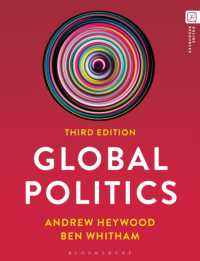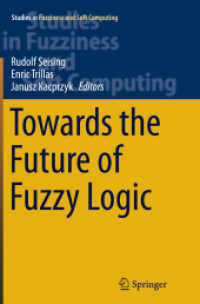- ホーム
- > 洋書
- > 英文書
- > Nature / Ecology
Full Description
Energy crises, which amount to painful combinations of energy shortages and soaring prices, have struck the United States several times in recent decades. Each time they have resulted in political and economic shockwaves because, when gasoline becomes more expensive, the American public tends to react with anger and suspicion. Energy crises instantly put related issues at the top of the nation's agenda, sometimes with dramatic consequences for public policy. What can we learn from recent history, particularly as it may predict the role that volatile public opinion will play throughout the energy policy making process?
As The Politics of Energy Crises demonstrates, one can discern patterns in politics and policymaking when looking at the cycles of energy crises in the United States. As such it is the first systematic historical study of political conflict, public opinion, and organized interest group and presidential and congressional action on energy issues, starting with the 1973 OPEC boycott and continuing through the present day. By charting the commonalities in political battles during energy crises, the authors make prognoses about what future energy crises will mean for United States policy.
Contents
Acknowledgements
Chapter 1: Introduction
Part I: The Roles of Agenda Setting, Public Opinion, and Trust during Energy Crises
Chapter 2: Energy Crises and Agenda Setting
Chapter 3: Public Opinion during an Energy Crisis
Chapter 4: The Question of Trust
Part II: The Political Dynamics of Energy Crises
Chapter 5: The Yom Kippur Arab-Israeli War: The Crisis of 1973-74
Chapter 6: The Iranian Oil Crisis: 1979-1980
Chapter 7: The Persian Gulf War: 1990-1991
Chapter 8: The Era of Peak Oil Energy Prices: The Oil Shocks of 1999-2000 and 2007-08
Chapter 9: Conclusion
Appendix A: Energy Mood Questions
Appendix B: Survey Data Information
Notes
Index








